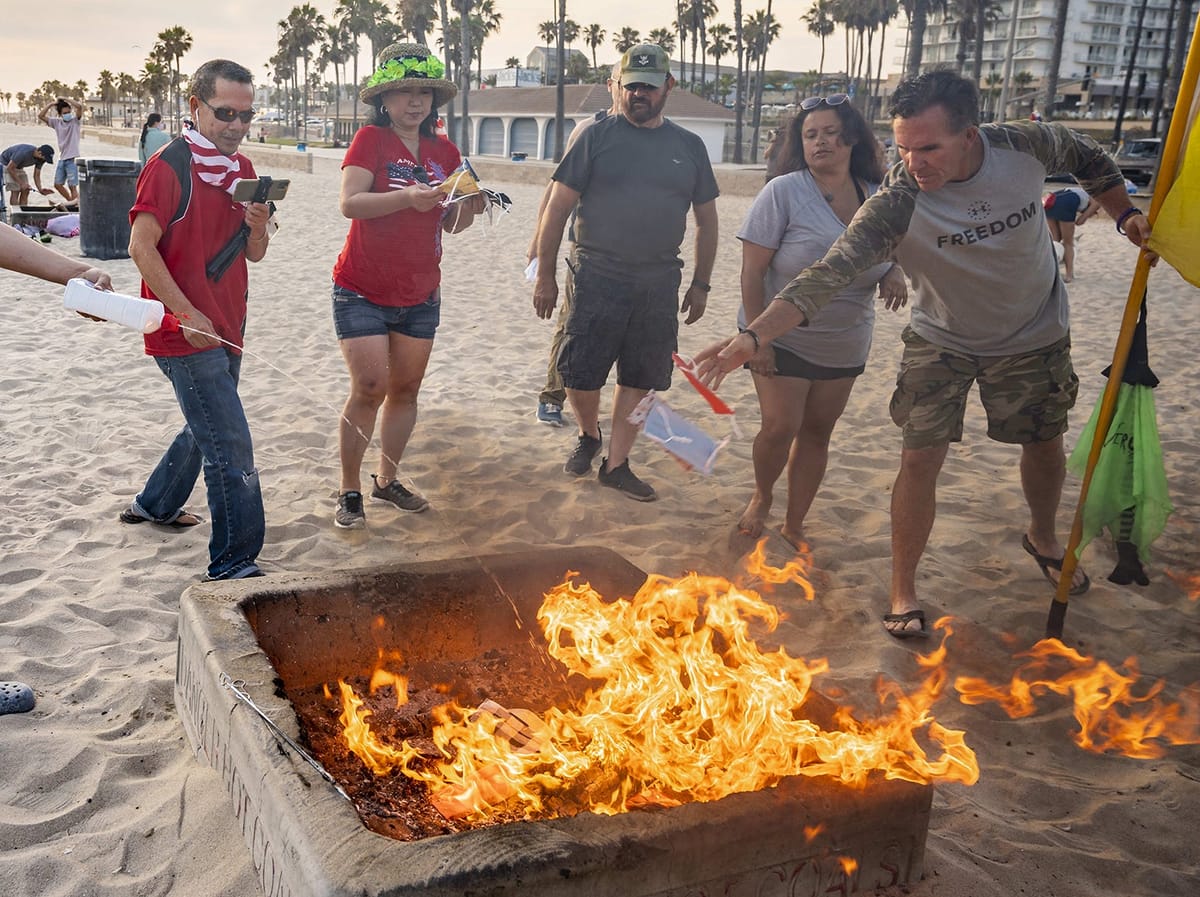Indignity Vol. 2, No. 7: The American sickness
FOREIGN POLICY DEP'T.

A Nation Presses on Toward Unlimited Covid
NEW YORK—On Monday, a supreme court judge for this state of 20 million people overturned a policy instituted by its governor, Kathy Hochul, which had required masks to be worn in indoor spaces. The decision followed an executive order from the newly elected governor of Virginia, Glenn Youngkin, forbidding schools from choosing to require masks.
A higher court reinstated New York's mask order the next day, pending appeal. But the very existence of the challenge demonstrated a now-familiar pressure on the two different governments of the two different states, pushing both toward the same outcome.
Across this large and otherwise fractious country, in its famous "blue states" and "red states" alike, the United States is converging on an ever-more-clearly articulated answer to the coronavirus pandemic: the pursuit, in defiance of most of the rest of the world, of a nationwide Unlimited Covid policy.
Supported by an alliance of conservative and liberal officials and amplified by both groups' preferred media, Unlimited Covid has evolved from a de facto national strategy to an explicit ideology. Rural farmers, suburban business owners, and urban professionals alike are now working diligently toward the goal.
The result is the world's highest overall coronavirus death toll and the highest current daily number of deaths, as the nation of 330 million encourages the omicron variant to spread. Since the start of the pandemic, American life expectancy has declined by at least 1.8 years.
Rather than fight the pandemic, the nation has embraced a goal of fighting against the fight against the pandemic. While other countries monitor case counts or hospital capacity, the United States is focused on driving the number of closures, vaccination requirements, and mask orders down to zero. Even where there are no closures, the most dedicated Americans battle against them anyway.
Front-page stories in the New York Times, running with more than weekly frequency, warn the public of the perils of "Zero Covid" policy in China, where lockdowns in the city of Xi'an apparently caused one man to die of a heart attack and one woman to miscarry a pregnancy. China's commitment to suppressing the virus, the paper told its readers on January 21, means that "a growing number of people are finding their lives suddenly upended."
Upendedness may be in the eye of the beholder. With record numbers of Covid cases exhausting medical capacity in the United States, Americans are routinely turned away from their own country's emergency rooms, or crowded out of maternity units, or forced to delay surgeries. But the Unlimited Covid policy defines normalcy differently—as a matter of choice and of attitude.
"I'm done with Covid," the American political entertainment personality Bari Weiss said on national television, to enthusiastic applause. She added: "It's not real anymore."
Nearly 4,000 of Weiss' fellow Americans had died of Covid that day. In a nation that has always prided itself on its pioneering spirit, though, reality is one more frontier to be clear-cut, plowed under, and fenced in.
The history of the pandemic is as subject to optimistic reinterpretation as its current conditions are. The liberal pundit Jonathan Chait, writing in New York magazine about the "historic blunder" of pandemic school closings, declared that "[b]y the tail end of spring 2020, it was becoming reasonably clear both that remote education was failing badly and that schools could be reopened safely."
In the spring of 2020, the first coronavirus vaccines were still almost a year away, the therapeutics that would eventually revive seriously ill patients like then-president Donald Trump were merely in the development pipeline, and New York City had settled into keeping its dead bodies stacked in freezer trucks. Chait's source for the claim that school openings were safe then was an article by the economist Emily Oster, arguing that it might be possible to open schools in the fall, if data from summer camps continued to show that children were unlikely to spread the virus. Summer-camp children did spread the virus, but schools began reopening in the fall of 2020 regardless.
By the fall of 2021, schools were open everywhere in the country. And they have largely remained open through the omicron wave in 2022, even as states called in police or the National Guard as substitute teachers for infected staff. Television news featured a crew of high school volunteers who had taken over as ambulance drivers in their town. Students who could attend school kept attending, even as mass absences due to Covid forced their schools to suspend grading or cancel high-stakes exams.
Although many Americans have doubts about the wisdom of Unlimited Covid, the policy has taken an unshakeable hold on the country. Pandemic-control measures that seem ordinary in other countries have been opposed with ever-escalating coercion and violence. Proponents of Unlimited Covid have assaulted and killed workers who try to enforce mask use, and have attacked testing sites and vaccination centers.
State and local officials, in turn, have banned mask mandates or vaccine requirements, even when, as in Virginia, communities still wish to use them. The United States Supreme Court has declared that the federal Occupational Safety and Health Administration lacks the occupational health authority to broadly require vaccination or testing in workplaces.
Legislative, administrative, and legal fights over public health rules are ongoing, but the effective national consensus is that anti-Covid measures are no longer worth the trouble. Though President Joe Biden's administration has grudgingly begun distributing limited numbers of protective masks and Covid tests to the public, Biden and his cabinet are focused on the message that what looks to outsiders like a virus-ravaged country is active and booming.
The spectacle of leaders boasting about the country's economic performance, even while the death toll rises, recalls China's Great Leap Forward at the turn of the 1960s, when Mao Zedong mobilized the entire country to meet impossible industrial-production goals. Peasants melted down their agricultural tools and cookware in the name of manufacturing steel, as millions starved to death.
But the movement for Unlimited Covid has a uniquely American character. It represents an informal yet powerful collaboration between the country's two mutually hostile political parties, across two different presidential administrations.
The country's pandemic response was initially defined by Trump, who chose to deny the risks of the virus, to suppress testing to keep official case counts low, and to delay any mobilization to produce tests or protective equipment. Facing a reelection campaign, and encouraged by a party line that the disease would be no worse than seasonal influenza, Trump and the Republican Party counted on allowing the virus to spread freely, generating natural herd immunity, after which they hoped it would subside on its own.
Joe Biden and the Democratic Party took power at the beginning of 2021, claiming a mandate to change the way the country handled the pandemic. In line with the party's technocratic spirit, and with the benefit of the newly available vaccines, Biden quickly launched a mass immunization program. That same technocratic outlook, however, led the administration to pursue what it hoped could be the most narrowly efficient strategy against the coronavirus—a domestic vaccination program only, rather than promoting international immunization, and without trying to catch up with the sort of testing, tracing, and targeted suppression that other countries had deployed.
When the virus kept mutating and proved itself able to spread even among vaccinated people, the Biden administration had not stockpiled tests or masks with which to respond to new waves. Caught up in its promise of a return to normalcy, and unable to narrowly tailor closures to meet specific problems, the administration failed to bring the country to a pandemic-fighting footing and allowed economic relief measures to expire.
In the end, the country settled on a contest between the original Republican program of counting on the unchecked virus to produce national herd immunity and a Democratic program of counting on a combination of vaccines and infections to produce national herd immunity. Although the details of it played out as partisan conflict—right-wing commenters went so far as to obfuscate their own vaccinations, to undermine Biden's efforts—the result either way was Unlimited Covid.
By redefining its failure to control the coronavirus as a success, the United States has rewritten its social contract and reshaped the expectations of its people. The anti-vaccination movement has gathered enough support that the Georgia state senate is considering a blanket repeal of vaccination requirements including the longstanding ones against measles or polio. Basic pandemic management—the Times disapprovingly described the Chinese regimen of "mass testing, stringent border controls, extensive contact tracing and snap lockdowns"—is considered something foreign and unrealistic.
In the Times opinion section on Tuesday, doctors Ezekiel Emanuel and Michael Osterholm warned readers that "China's Zero-Covid Policy Is a Pandemic Waiting to Happen." They described "severe restrictions" that China is imposing on participants in the upcoming Beijing Winter Olympics:
Those who receive a medical exemption from vaccination are being required to quarantine for 21 days after entering the country. Even the vaccinated will have to present two negative tests. Olympic participants must submit to daily Covid tests and will be restricted to an Olympic bubble where they will be confined to prevent spread to the local population.
These rules roughly correspond to the rules put in place by America's National Basketball Association when it resumed play in 2020. But now Emanuel and Osterholm were calling them "extreme measures" in pursuit of an "unattainable" Zero Covid policy.
Although China's Covid death toll of 6,000, as tallied by the World Health Organization, "seems like an enormous success," the two doctors wrote (rounding up from the actual WHO tally for China, which is 5,700), the effort to suppress the virus can be no match for the contagious omicron variant. Through its inflexible ideological commitment to totally suppressing the coronavirus, they wrote, China has left itself "wholly unprepared for what will become endemic Covid."
The countries that have stopped the virus, that is, cannot keep stopping the virus, because the experts say there is already too much of the virus circulating. China is a pandemic waiting to happen because the United States is wholeheartedly committed to being a pandemic. The American program, they say, will be the program for the entire world.






